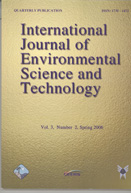
|
International Journal of Environment Science and Technology
Center for Environment and Energy Research and Studies (CEERS)
ISSN: 1735-1472
EISSN: 1735-1472
Vol. 13, No. 6, 2016, pp. 1497-1504
|
 Bioline Code: st16141
Bioline Code: st16141
Full paper language: English
Document type: Research Article
Document available free of charge
|
|
|
International Journal of Environment Science and Technology, Vol. 13, No. 6, 2016, pp. 1497-1504
| en |
Comparison of different phases of bismuth silicate nanofibers for photodegradation of organic dyes
Batool, S. S.; Hassan, S.; Imran, Z.; Rasool, K.; Ahmad, M. & Rafiq, M. A.
Abstract
Two different phases of bismuth silicate
nanofibers [Bi2SiO5 and Bi4(SiO4)3] were synthesized
using electrospinning technique. BS nanofibers were tested
for the photocatalytic degradation of methyl orange and
safranin O dyes. Different phases of BS affect the photodegradation
efficiency of nanofibers. Impressive
enhancement in photocatalytic efficiency and BET surface
area of Bi4(SiO4)3 was observed over Bi2SiO5. A speedy
reduction in dyes concentration was attributed to the rapid
formation of oxygenated radicals by the capture of electrons
and holes, generated in the BS nanofiber by UV
irradiation. Therefore, the photocatalytic mechanism was
elucidated using impedance spectroscopy at room temperature.
The lower impedance value of Bi4(SiO4)3 nanofibers
had improved high-efficiency charge transfer capability.
The cycling efficiency (30 times) and recovery characteristics
pointed out that Bi4(SiO4)3 nanofibers photocatalysts
had high constancy, resilience, and regeneration ability.
Keywords
Bi4(SiO4)3 nanofibers; Crystal phases; Electrospinning; Photocatalytic activity
|
| |
© Copyright 2016 - Islamic Azad University
Alternative site location: http://www.ijest.org
|
|
